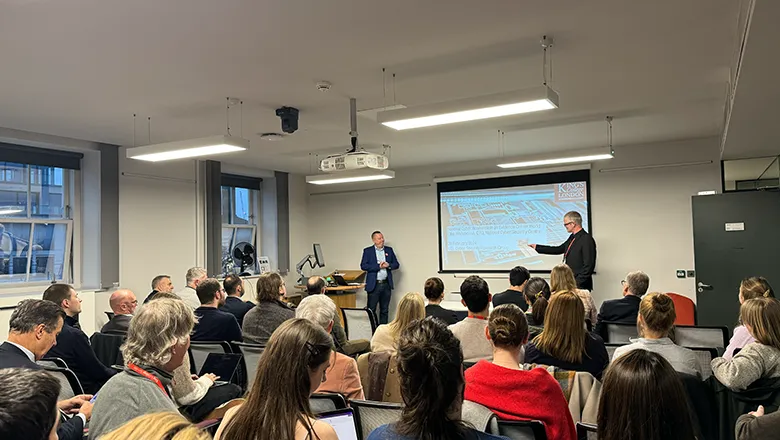Cyber has become a potent tool for facilitating a spectrum of criminal activities, from organised crime to sanctions evasion and even espionage. This reveals the need for a paradigm shift and prompts us to consider our long-term objectives based on three key questions: What does our vision of cyber resilience look like in two decades? Have we truly articulated the metrics for success? Can we bridge the gap between aspiration and affordability? Our overarching goal is to ensure a baseline level to enhance national cyber resilience.
Ollie Whitehouse
11 March 2024
To tackle the evolving threat landscape, stronger strategies and interventions are crucial, says Cyber Security expert
Ollie Whitehouse, Chief Technology Officer of the UK’s National Cyber Security Centre (NCSC), gave a talk at King’s emphasising the importance of implementing an evidence-based approach to cyber resilience in order to effectively address current threats to UK security.

He said the UK has led various iniatiatives to improve global security through its proactive approach to cyber security, exemplified by the launch of the Active Cyber Defence (ACD) Programme in 2017. However, to effectively tackle the evolving threat landscape, stronger strategies and interventions are crucial.
Ollie Whitehouse also emphasised the importance of the UK tackling the growing cyber threats posed by highly capable adversaries, who are challenging the nation's security in cyberspace. “This challenge occurs within a global context where international norms are adhered to. Yet, we encounter increasing proliferation of capabilities, once exclusive to nation-states, now accessible to a broad range of actors”, he added.
Understanding the threat is no longer our primary challenge; we understand it properly. The true dilemma lies in how we translate this understanding into actionable impact. [...] What was once the exclusive domain of nation-states, now encompasses a broad spectrum of interests and actors, posing significant challenges to our security
Ollie Whitehouse
In addressing current cybersecurity challenges, Ollie Whitehouse suggested balancing incentives and disincentives, leveraging tax credits and liability frameworks, promoting further academic research in the field and focusing on transparency and accountability.
In government, significant developments are underway. Recently, the White House’s Office of the National Cyber Director (ONCD) published a paper for software measurability, which is a crucial step towards addressing information asymmetry. Concurrently, our objectives at the NCSC are focused on building evidence bases, rectifying market flaws, establishing incentives and providing interventions for those unable or unwilling to engage at an individual level.
Ollie Whitehouse
Dr Tim Stevens, chair of the talk and director of King’s Cyber Security Research Group, highlighted the role of academia in shaping evidence-driven cybersecurity policies and practices.
Universities have a key role to play in national cybersecurity. They are drivers of technical innovation and security solutions. They help develop the deep understanding and rich evidence that gives cybersecurity policymakers and professionals the confidence to pursue effective cyber risk and resilience programmes. Crucially, they are where the cybersecurity leaders of tomorrow learn to think critically and imaginatively across multiple areas of policy.
Dr Tim Stevens
King's Cyber Security Research Group will continue hosting open talks on the current challenges and opportunities of cyber security. More information at https://www.kcl.ac.uk/research/kcl-cyber-security-research-group


